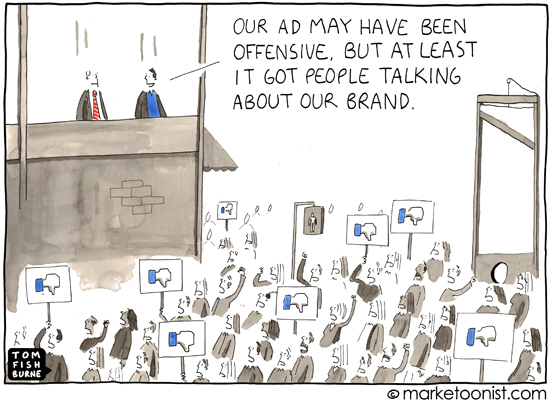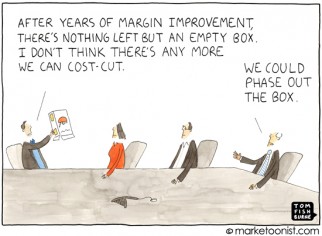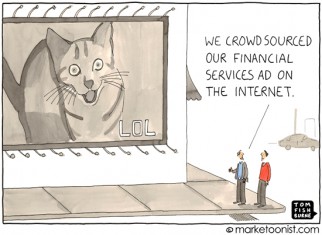There’s a old marketing axiom that advertising’s greatest enemy isn’t rejection; it’s indifference. Mountain Dew and Hyundai both tested this philosophy in the last two weeks with ads they ultimately pulled for being too offensive.
In today’s social media world, where there’s no longer a captive audience, brands are pushing boundaries more than ever to get attention (and to try to go viral). The question for marketers is where to draw the line.
Mountain Dew’s ad was not only criticized for trivializing battered women, it was called the “most racist commercial in history”. Hyundai’s ad showed a man trying to commit suicide by taping a hose to his car exhaust, only to be thwarted by the clean emissions technology in the Hyundai iX35.
In the pursuit of going viral, where should marketers draw the line? Is there a long-term cost for getting it wrong and offending your audience?
In the post-game analysis, many commentators suggested that it didn’t matter that Mountain Dew and Hyundai offended its audience. They argued that the benefit of getting talked about by media and consumers outweighed the fact that so many were talking about the brands’ bad judgement.
I disagree. Not every brand should act like a shock jock. Not all publicity is good publicity. Not all viral is good viral.
It all comes down to brand purpose. Axe/Lynx will draw a different line than Dove, even though they’re part of the same company. I think marketing can be provocative while still holding true to the brand’s purpose.
No brand wants to be ignored. But I think marketers sometimes forget whey their brands exist, and who they’re trying to serve.
(Marketoonist Monday: I’m giving away a signed print of this week’s cartoon. Just share an insightful comment to this week’s post. I’ll pick one comment at 5:00 PST on Monday. Thanks!)



Ross Hudgens says
Every situation is different. To some, the core audience may enjoy the aggressive ads, even if they offend the part of their market that does not respond to it. Smart brands hopefully are testing the response to the ads by their target market, then responding accordingly. In many ways, the response of the market segments that don’t matter isn’t that important – at least from a sales perspective, although the ethics of offending a group is another matter entirely.
Couch Zambane says
I sure hope offensive commercials lose consumers in the long term even if they get clicks in the short term!
Copywriter Kevin Francis says
Agree with Ross that there is not necessarily a problem in being controversial or “offensive” provided that you get through to the target market you want to appeal to and they don’t find the ad off-putting.
There needs to be a STRATEGIC reason for such messaging.
Problem in both of the examples is that they are plain dumb and almost gratuitously offensive. As someone who has just bought a new Hyundai, the ad mentioned has lowered my opinion of the company.
The other big problem is that there’s no objective measurement of the results of these ads (sure, there will be some pseudo assessment of “impact” or some such nonsense, although I suspect in these cases the ad agency will want to simply avoid the issue and move on!).
More examples IMO of how many big companies are really clueless about marketing and the dangers of outsourcing any advertising or marketing decisions to ad agencies run by people more concerned about being hip than making sales.
Bill Carlson says
I’ve been in meetings where an idea/concept/strategy which is clearly questionable gets pushed through by someone with the ability to drive decisions, usually claiming that being edgy, pushing the envelope, etc., is what differentiates a brand from competitors. This can be the agency or the client, not picking on anyone in particular. And in that process, where there were probably some voices of reason around the table, anyone raising concerns is cast (and dismissed!) as being too conservative, “old school”, etc.
A statement like “…there is not necessarily a problem in being controversial or “offensive” provided that you get through to the target market you want to appeal to and they don’t find the ad off-putting” is scary to me — a little too Mad Men for my taste. Specifically because, as Kevin points out, there are “dangers of outsourcing any advertising or marketing decisions to ad agencies run by people more concerned about being hip than making sales.” Though again, I think that attitude can apply to clients equally as accurately.
I think boundaries are being pushed on many fronts and standing out becomes more and more challenging. Consider the differences in what we see and take for granted on broadcast TV today versus 20 years ago or probably even as recent 5 years ago. Super-realistic violence in video games (I now miss Donkey Kong! :). Consider James Bond’s recent adventures vs. Goldfinger. Etc.
So those that are seeking to stand out in an environment where the boundaries are already well extended run the risk of crossing that fine line from “edgy” to offensive. We don’t want to kill all that creative thinking, we just need to find better ways to evaluate it, maybe being a little smarter in the testing phase to avoid the black eyes.
Dan Duyser says
I’m not condoning these ads by any stretch, but I think it’s important to recognize that it was actually a Hyundai UK ad (not America). In my experience, ads in Europe tend to be a late racier and controversial, which would make this particular ad less of a shocker in the intended market. Unfortunately for Hyundai Motor America, the Internet is global which reaches consumers in all markets. Now more than ever, companies need to be conscious of how their marketing affects consumers across the world.
Paul (from Idea Sandbox) says
What is interesting about *both* ads and several others recently pulled are comments from the companies that the ads are unauthorized, or weren’t approved, or weren’t supposed to be aired/viewed?
What the heck is going on in advertising that millions of dollars are being spent on crews, travel, photographers, catering, editing… and yet no one with responsibility knows they exist?
Concetta says
In regards to Mountain Dew/Pepsi, I think they let their partnership with Tyler “The Creator” go a little too far without supervision. While the initial concept might have been funny, the execution was not – and TC is WELL known for these sorts of issues. In essence, the ad doesn’t actually benefit Mountain Dew, it benefits Tyler because now billions of people know exactly who he is, and are looking into the Odd Future Collective.
The Hyundai folks, well, that was just an issue of poor taste. Again, the initial concept might be funny (and I kind of think it is a bit) but its easy to see exactly where the consumer mind is going to go if they see that – and who wants a concept like suicide associated with their advertising, and therefore, with their brand?
Edgy can be very funny, and I think the Axe ads, the “Dr Pepper 10” ads, and the Dove ads are all very unique examples of edgy and controversial done well. People talk about them but mostly in a flattering tone for being willing to “go there”. Hyundai and Mountain Dew join GoDaddy, Burger King, and the Lung Cancer Alliance for having edgy ads that went so far over the line people aren’t talking about them, they’re talking about the side things (the director, racism, sexism, death, suicide, and how these companies could have let these ads by leadership).
I don’t buy for a second their line that they didn’t know about these ads – and that’s part of what has made their use of them even more disgusting. You’re right, Tom – controversy for the sake of controversy is not good marketing.
Ori Pomerantz says
Paul: What is interesting about *both* ads and several others recently pulled are comments from the companies that the ads are unauthorized, or weren’t approved, or weren’t supposed to be aired/viewed?
Ori: It is like sending your kids to school. You can outsource a function (advertising / children’s education), but you cannot outsource QA. Nobody cares about your interests as much as you do.
Alternatively, it could be that the ad was “unauthorized” in the sense of plausible deniability – that the claim it is unauthorized is simply a way not to deflect blame.
Jeannie C says
I have been an advocate of being controversial. A brand is defined by having someone who likes you and someone who really doesn’t care much for you. I’ve written about it on my blog (http://bit.ly/12JVpA9). Just this weekend, I posted on twitter an example that I liked (http://bit.ly/16bJthg). With all that said, I disagree with the execution that’s highlighted here. I think the most telling is that Pepsi pulled the ad. Would Tyler “the creator” pull the ad? Maybe. But there a good chance that he wouldn’t have, because being off-color, maybe even offensive, is consistent with his brand. Also, maybe there wouldn’t be the backlash either if it’s just to sell him, because again this offensive joke kinda fit with his brand. But the bottom line is, it doesn’t fit with the Mountain Dew brand.
I think this is what Pepsi needs to pay attention to as it does more and more celebrity collaboration in search for street cred. Some wondered if Beyonce had too much influence on the Pepsi ad, and this you can’t help but assume that Tyler “the Creator” had too much creative influence. I would love to see the creative brief that this ad was built against, and see how does it deliver on the brief. What was the brand message it was suppose to deliver? Taste? Nope, no taste appeal there. Courage to just “dew” it? Nope, the woman didn’t do anything. So, I would love to understand how this ad is on brief.
Chances are it isn’t. That’s where this failed. Ads that doesn’t communicate a brand message is a momentarily distraction at best (even if it goes viral, it doesn’t materially say anything and offer a reason to buy). At worst, well, I think we’re witnessing that.
As for the statement of it was never supposed to be aired, I would assume that simply mean it was never supposed to be aired on TV. But I would assume that it was always meant to be shared with the public. I think this speaks to internal culture at many company where if it’s a TV spot, it’s scrutized to make sure it’s on-strategy since millions would see it and the investment is well-spent. But if it’s online, it’s a test-and-learn, and it’s for a limited audience that’s going online, and the risk is small. But in truth, the risk isn’t small. Millions can view an ad online. I think we just got reminded of the lesson that no matter what you’re doing, how would you feel if that little something got picked up as front-page news on your home town newspaper… Will you still be proud of it? If not, you probably shouldn’t do it.
Tracy Carlson says
It’s hard to imagine any universe in which a brand, whatever its audience, is well-served by crafting ads that exploit battered women and would-be suicides. Both reflect people trapped in incredible pain. Anyone capitalizing on this pain is a on the bully/sociopath spectrum–and does any brand aspire to this? What’s next: child rape?
Allen Roberts says
The lesson may also be applied to what may previously have been “private” conversations.
The MD of one of our major retailers (Myer) here in Australia made some comments last week on a government policy in a closed forum, and they were reported on social media, without the full context. A “shitstorm” on social media ensued, forcing two apologies, the first not being regarded as strong enough.
It was not even a slip of the tongue, it was just one sentence short of a completely reasonable point, so he was hung by marginal ambiguity by omission
Stephen says
I agree (with Tom) – but I do not share his reason.
The important ‘cost’ is not whether an offensive ad wins or loses market share, but whether we (as marketers) have behaved in an ethically justifiable manner.
And to think otherwise, to think that sales and market share can be used to justify an action dehumanises marketing and sets us along a path of ‘the ends justify the means’. And that ain’t right!
Linette says
The whole concept of “controversy marketing” flies in the face of two things: 1) Brand loyalty “can” be broken and is costly and difficult if not, next to impossible to reclaim; and 2) One of the primary purposes of advertising is to build market share. So if a marketer fails on both counts because of an offensive campaign, who cares if people are talking? Talk is cheap and pays no bills, dividends, etc.
Gbenga says
Controvesy Marketing could be brillaint if well done, with respect paid to cultual movements. A good example, I hope, is one advert that’s taken over the media space in Nigeria recently. Apparently, a telco had not tied a particularly funny and loving guy, who played a character in some of their ads a couple of years ago, to a binding contract. When the technology arrived that allowed customers of one telco to move to another while still retaining their old numbers, a more aggressive telco launched their champaign with this guy at the lead. He had “ported”, leaving the other guys with eggs on their face. Their has been a lot of talk and serious buzz has been generated. Of course, people say the move was more controversial than creative. I think it was brilliant. Now, agencies may have to tighten up contracts for their character actors, which won’t be a bad thing for this market.
tomfishburne says
Hi all,
Great insightful perspective from everyone as always! Many thanks! This week’s print goes to Linette. I completely agree with the back-to-basics filter around brand loyalty and the goal of building market share. Getting people talking often flies in the face of those two things.
Thanks!
-Tom
Linette says
Thank you, Tom. How exciting! I love your cartoons and blog. And I can’t wait to get my print.